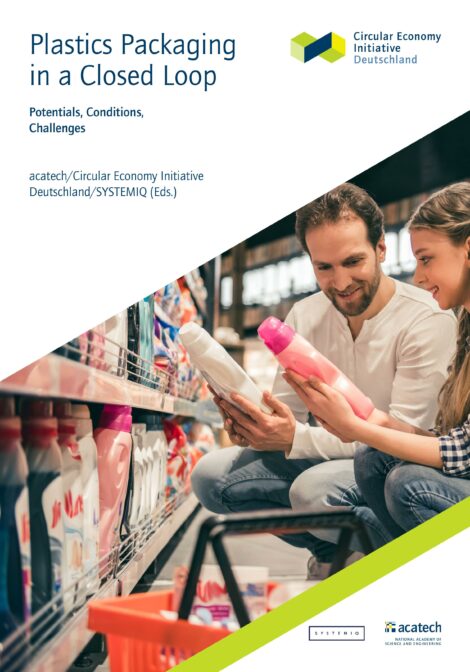Plastics Packaging in a Closed Loop – Potentials, Conditions, Challenges
Most current patterns of production and consumption follow a linear “extract, produce, consume, dispose” model. According to the Circular Gap Report 2020, the global economy is just 9% circular. This economic model is contributing to a massive transgression of “planetary boundaries” and the destabilisation of ecosystems and factors essential to human life such as the climate system and biodiversity. As a result, there is currently much discussion of a paradigm shift in the industrial value creation model, away from a resource-intensive system and towards a resource-productive, predominantly circular model. This shift offers significant opportunities for an industrialized, exporting nation like Germany – ultimately, it entails nothing less than a recasting of the “Made in Germany” model.
The European Union and several of its member states have already developed strategic plans for the transition to a resource-efficient economic system based on circular economy principles. Non-European countries such as China, Japan and Canada are also following the same fundamental approach. However, Germany has yet to formulate a plan of its own.
The Circular Economy Initiative Deutschland (CEID) is a multi-stakeholder initiative involving over fifty institutions from science, industry and civil society that aims to lay the foundations of a plan for Germany. In its interdisciplinary, cross-sectoral working groups, some 130 experts consider how to enable and implement circular economic models, exploring potential fields of application and discussing the conditions that could facilitate successful implementation. The Circular Economy Initiative Deutschland is developing targets for the transition, with a focus on the following themes:
- Circular business models and digital technologies as drivers for innovation
- New value networks for batteries and packaging
- Framework conditions for a circular transformation and assessment of circularity’s economic potential
Between October 2019 und December 2020, the Working Group “Packaging” of the Circular Economy Initiative Deutschland developed a joint target picture 2030 and recommendations for action for the establishment of a Circular Economy for packaging. With a cross-value chain approach, the Working Group highlighted incentives and benefits for the recycling of packaging materials across relevant stakeholders and thereby identified options for action along the entire value chain.
With the report, the members support the initiation, implementation and long-term anchoring of the Circular Economy in Germany and beyond.
The 20 members of the Working Group “Packaging” are experts from leading academic institutions, German businesses and civil society across the entire packaging value chain. This composition allowed the group to achieve its goal of addressing the topic as holistically as possible.




